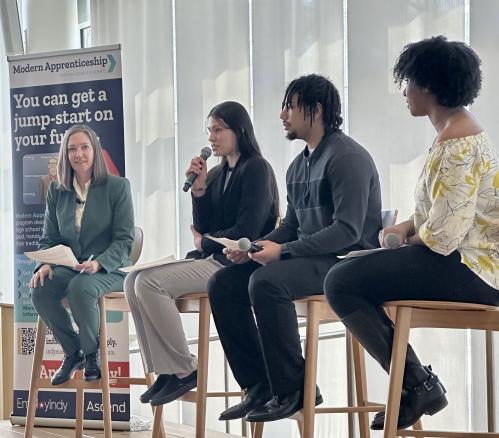This case study is part of the Spotlight on Local Recovery Efforts series, a feature of the COVID-19 Metro Recovery Watch.
Summary
The COVID-19 pandemic and the nationwide protests for racial justice in the wake of George Floyd’s murder in Minneapolis will prompt major changes in U.S. workplaces during recovery. For starters, many employers who had to furlough or lay off employees during social distancing orders may slowly begin hiring again to rebuild their workforce. Employers will also look to diversify their workforces, particularly by race, to better reflect the world we live in and take advantage of the vast benefits it can bring. Employers seeking to hire will be met by a historically large population of unemployed workers, opening the opportunity to rethink hiring practices and establish more productive and equitable workplaces moving forward. With the COVID-19 economic crisis hurting business outcomes and exacerbating racial disparities, it is critical to incorporate interventions that improve talent development in today’s economic development strategies in order to see the necessary growth and upgraded capabilities across various industries.
One model that offers advanced talent development services is HireReach. In 2018, Talent 2025, a group of 100 CEOs from the West Michigan region, and West Michigan Works!, a local workforce agency, collaborated to launch HireReach, a three-year initiative that recruits, trains, and advises employers to hire entry-level and middle-skill talent using an evidence-based selection process. Their model increases the accuracy of candidate selection, which in turn strengthens the quality of the employer’s workforce and reduces turnover. It also mitigates biases in the hiring process by using a data-driven approach to assess candidates fairly and objectively. HireReach supports participating employers with a monthly shared learning event called the Community of Practice as well as with monthly consulting sessions to support individual employers in adopting the evidence-based selection process.
Execution
In 2010, Mercy Health made a strategic decision to diversify and grow their regional talent pipelines in order to meet increased demand for a sizable health workforce. To improve key metrics such as turnover, time to fill, retention, and diversity, Mercy Health recognized the importance of complementing recruiter and hiring managers’ skills with data-driven methods and analysis that assessed prospective employees’ knowledge, skills, and abilities in areas relevant to the job for which they applied. From this, Mercy Health pioneered the use of the evidence-based selection process (EBSP). Between 2010 and 2018, Mercy Health employed over 10,000 candidates using this process, reporting a 23% reduction in first-year turnover, a 16% reduction in time to fill, and a doubling of the racial/ethnic diversity of the workforce.
Mercy Health’s success led to the creation of HireReach, which teaches the evidence-based selection process in an effort to replicate those results at other West Michigan employers across various sectors. HireReach and Metrics Reporting— a workforce development consulting firm—define evidence-based selection as a fair, objective, data-driven strategy that helps organizations make better hiring decisions. Drawing from industrial and organization psychology, evidence-based selection utilizes a standardized, consistent process and relevant quantitative data to facilitate a multidimensional assessment of job candidates. This approach is an optimal model for companies, as it creates better matches between workers and jobs, decreases time-to-hire, reduces first-year turnover, increases workforce diversity, and boosts productivity. The success of evidence-based selection is accredited to its ability to mitigate built-in biases in the hiring process; many of these biases tend to disfavor Black and Latino or Hispanic applicants. Using evidence-based selection forces employers to hire based on the candidate’s foundational and occupational competencies while discounting the irrelevant factors that often skew the human judgement process.
To execute the program, HireReach convenes cohorts of 10 to 15 employers to meet monthly for a full year of training with experts, peer-to-peer sharing, interactive learning and development, and support for selection process redesign. Employers are encouraged to send their chief human resource officer, director of talent acquisition, lead recruiter, diversity and inclusion director, and chief executive officer/chief operating officer to participate. The initial cohort occurred from January to December 2019. It included a diverse group of some of the largest employers in the region, including BarFly Ventures, Cascade Engineering, the city of Grand Rapids, Davenport University, Kent County, Ottawa County, Shape Corp., Spectrum Health, Steelcase, and Warner Norcross & Judd. Collectively, these employers represent six industry sectors and employ more than 40,000 workers. The second cohort began in January 2020 and will continue throughout the calendar year. Since the pandemic, the Community of Practice events and consulting sessions have taken place over GoToMeeting video calls.
In designing the HireReach program, the partnership of Talent 2025 as a CEO group and West Michigan Works! as a local workforce agency allowed them to collaborate and connect both the demand (employer) and supply (job seeker) elements of the talent pipeline. While employers are currently the main focus of the initiative, later phases of HireReach will require access to job seekers as employers implement the evidence-based selection process that hires new talent. In addition to these organizations, Metrics Reporting has made significant contributions to the program. Bill Guest, president and chief solutions architect at Metrics Reporting, was the lead consultant on the Mercy Health project and works with HireReach to provide technical expertise in the areas of change management, I/O psychology, assessments, and compensatory scoring. Guest coauthored an EBS research brief and guidebook with Rachel Cleveland, a project manager at HireReach, that outlines the core aspects of the innovation. In addition, Jim Sharf, director and chief industrial psychologist at Metrics Reporting, has been engaged as HireReach’s legal defensibility expert.
Cost and timeframe
HireReach is funded by a $2 million grant from the W.K. Kellogg Foundation and the Doug & Maria DeVos Foundation. The grant finances HireReach between June 2018 and May 2021 and covers consultants and other costs incurred by Talent 2025 and West Michigan Works! when running the program. Because of this foundation funding, HireReach has provided its services to employers in both of their cohorts free of charge, which is an extremely valuable add as the program continues while participating companies weather and recover from the COVID-19 economic crisis.
Jacob Maas, CEO of West Michigan Works!, estimated the cost of an employee turnover is typically $3,500 to $4,000. He hopes the initiative can show a cost savings of 5% to 10%.
Key components and features
HireReach offers a two-pronged approach to train the employers in their cohorts. First, they provide monthly Community of Practice meetings that:
- Cover in detail how to implement evidenced-based hiring practices
- Facilitate peer-to-peer learning across industries
- Feature a panel of experts in inclusive leadership, unintentional bias, legal defensibility, change management, the evidence-based selection process, and other technical areas
- Include interactive learning and development activities
Second, HireReach provides consulting for employers to further support the implementation of HireReach’s evidence-based practices. The HireReach team meets with each employer team to:
- Share and review documents
- Provide training, guidance, and support while tracking the progress of the EBSP
- Work through the major milestones in the program with a goal of supporting each employer team in their implementation
Successes
As previously mentioned, Mercy Health’s implementation of the evidence-based selection process that is now the basis of HireReach’s program resulted in a 23% reduction in first-year turnover, a 16% reduction in time to fill, and a doubling of the racial/ethnic diversity of the workforce. Because the program’s first cohort finished its yearlong training only seven months ago, their successes are still pending. Even still, The Holland Sentinel recognized Ottawa County, one of the organizations in the first cohort, for its commitment to diverse hiring practices and involvement with HireReach. Additionally, since the COVID-19 pandemic and George Floyd’s murder, HireReach has reported a renewed commitment to the work by their employer teams, who are eager to increase staff diversity and improve business outcomes.
Considerations
The COVID-19 pandemic’s social distancing orders have disrupted HireReach’s regular programming. All monthly meetings have transitioned online, and HireReach has taken measures to ensure that employer teams stay on track in their work to learn about, design, and implement the evidence-based selection process, such as assigning homework between meetings to replace the Community of Practice in-person activities and working time. Some of the biggest challenges that have accompanied these new conditions include a loss of the personal connection with the employer teams, difficulty with project management and accountability due to employers’ competing COVID-19 priorities, learning and understanding new virtual platforms, and occasional tech issues. To combat feeling a loss of personal connection, HireReach encourages web camera usage and small talk at the beginning of each meeting. They have selected GoToMeeting as their primary virtual meeting platform.
Beyond pandemic-related disruptions, HireReach is an intensive, high-capacity intervention that requires deep expertise within intermediaries and consultants. Achieving scale is the major challenge going forward. Scaling the program will require replicating these capabilities across a broader range of companies, which could be pursued through a “train the trainer” model, but would demand that the quality of the services would scale as well. Similarly, for other communities seeking to replicate the HireReach model, they would need to find and obtain the services of consultants with these capabilities.
Sources
- HireReach: website
- HireReach: program overview 2020
- HireReach: executive summary 2018
- Metrics Reporting, Inc. research brief: Evidence based selection process
- School News Network: GRCC honored as a promising place to work
- Holland Sentinel: HireReach to help employers improve hiring process
- Holland Sentinel: Ottawa County working to improve inclusion, diversity
- U.S. Bureau of Labor Statistics: State employment and unemployment summary June 2020
- Economic Policy Institute: State unemployment by race and ethnicity 2019 Q4
- Brookings: Why are blacks dying at higher rates from COVID-19?
- Proceedings of the National Academy of the Sciences of the United States of America (PNAS) research article: Meta-analysis of field experiments shows no change in racial discrimination in hiring over time
- New York Times: Coronavirus unemployment tracker
- McKinsey executive briefing: COVID-19: Implications for business
Do you have a similar solution in your area? Is there another problem that you’re tackling in an innovative way that you’d like to share with a wider audience? Contact us at [email protected].






